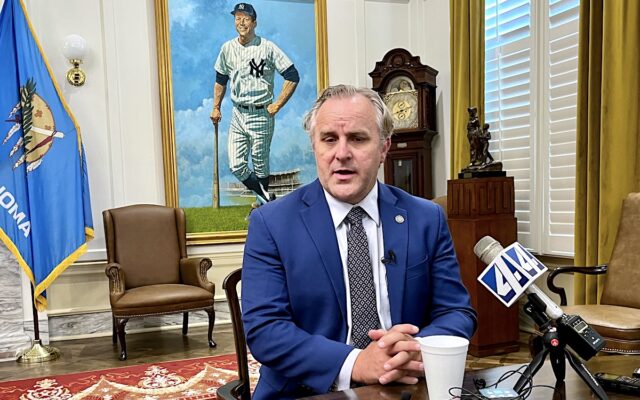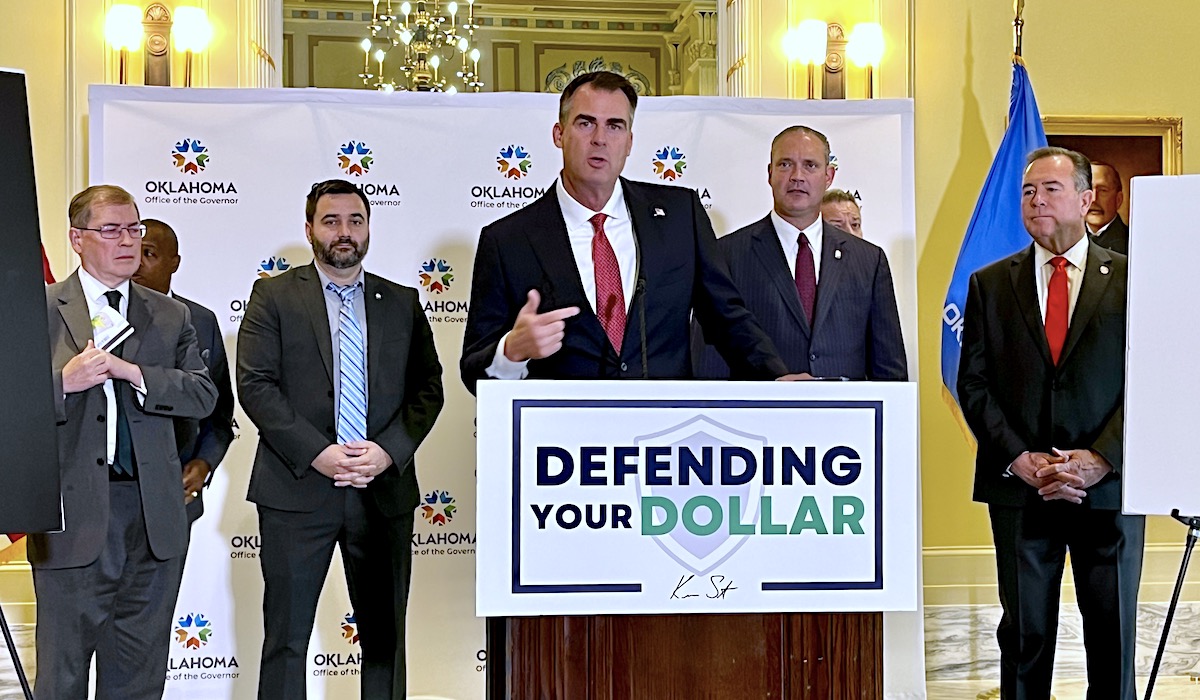

The second special session of the 2023 Oklahoma Legislature functionally ended five hours after it began today, with the State Senate adjourning in exasperation after Gov. Kevin Stitt held a morning press conference but declined senators’ invitation to discuss his tax cut desires in front of the Appropriations and Budget Committee.
“I had not planned on doing the following motion today,” Treat said on the Senate floor around 2:30 p.m. “But with the governor not answering the call and showing up in special session in the Appropriations and Budget Committee for a session he called and (for which he) still has not articulated a plan, I will, Mr. President, move that when the clerk’s desk is clear (…) the second extraordinary session of the 59th Legislature adjourn sine die.”
After a voice vote, presiding Sen. Darcy Jech (R-Kingfisher) banged the gavel, Senate Appropriations and Budget Committee Chairman Roger Thompson walked to his office, and Treat gathered to answer questions from media.
“It is frustrating,” said Thompson (R-Okemah). “For a governor that’s been talking about transparency, he was not transparent. If he has a message that’s going to impact the budget of the state of Oklahoma, come to the budget committee and explain it. Help us help you.”
Treat (R-OKC) expressed similar sentiment.
“I walked into leadership at 8 a.m. this morning and told them if the governor showed up at 10 a.m. that we would have to stay around and hear him out and stay in session,” Treat said. “We wanted to give the governor the benefit of the doubt that he would actually show up and defend his plan. I’m very disappointed that he chose not to. It’s not like he was out of the country, it’s not like he was out of state, he was downstairs. He was three floors down holding a press conference called obviously after we had invited him to the 10 a.m. (committee meeting).”
At Stitt’s press conference, he was asked if he would be attending the Senate committee. After Stitt said he would not participate, senators decided to begin their meeting, which lasted about two hours and included testimony from Senate staff and state fiscal agency leaders.
“It’s the height of irony and hypocrisy to put in a call for budget transparency and then say I’m willing to meet behind closed doors with your caucus, but I’m not willing to meet in an open meeting,” Treat said. “To be clear and abundantly clear and transparent with you, he has not requested from myself or the caucus chair a meeting with our caucus. He has insinuated that in press conferences. He also has insinuated that him and the speaker and I continue to meet every Tuesday. That is not true. We meet on Tuesday during session and during session only. We have not met since May.
“I don’t know what the governor really wants, other than what he tweets and what he told you all at the press conference today.”
Abegail Cave, Stitt’s chief of communications, released a statement after the Senate’s abrupt adjournment.
“The governor has been clear. He wants a quarter percent tax cut and to slow the growth of government,” Cave said. “Senate leadership is denying Oklahomans their right to keep their hard earned money while continuing to increase the size of government every year.”
‘There’s no delegitimizing special session’

While Stitt declined to testify before senators, he opened the day with a press conference, standing between charts and in front of cameras with House Speaker Charles McCall, State Treasurer Todd Ross, Oklahoma Republican Party Chairman and Sen. Nathan Dahm and national anti-tax crusader Grover Norquist to pitch a broad proposal: the state is collecting too much money and citizens should keep more of it.
But asked whether declining senators’ committee invitation might delegitimize the special session he called, Stitt appeared not to predict the Senate’s next chess move.
“There’s no delegitimizing special session. We’re here. It is special session. The governor has called it. He’s asked for tax cuts to slow the growth of government,” Stitt said. “I have done my job. The Legislature has to do their job.”
Stitt said he would be “ecstatic” if lawmakers would simply pass another 0.25 percent reduction to the Oklahoma income tax rate, something they did in 2021. House Republicans subsequently have advanced other bills that would reduce the state income tax rate further, but the Senate has expressed caution.
“Just put it up for a vote,” Stitt said at his press conference. “That’s all we’re saying. Just put it up for a vote. Why are we letting a couple of people not let the Senate vote on something?”
Moments after speaking at Stitt’s press conference, McCall also said the Senate should take a vote on reducing the state’s top income tax rate from 4.75 percent to 4.5 percent, which would reduce state collections about $240 million per year.
“I think what the governor is really asking for is he wants a quarter-percent cut,” said McCall (R-Atoka). “At this point, this is the fourth session that we’ve talked about this — counting two constitutionals and now two specials — put it up for a vote. I mean, just let the chips fall where they are. If the Senate doesn’t want it, then the issue is closed. But as of now, only the House has voted on this stuff.”
McCall said he wanted to have productive conversations with Senate leaders about the idea of an income tax rate reduction, but he noted that the topic and the philosophical disagreement between chambers is not new.
“We are going to try to find agreement with the Senate,” McCall said. “I’ve told the Senate we are going to be patient. I told them three weeks ago my patience is about to — now that we’re back in special session — it’s running thin. But we need an agreement on something by this week. Otherwise, I think the House Republican Caucus will advance something.”
As the House gaveled into special session Tuesday morning, a handful of lobbyists watched the machinations from the House lobby, with many expressing skepticism about whether Stitt’s special session call will yield any progress. Some legislators also pondered the peculiarities of the process, unaware that only a couple of hours later the Senate would choose to adjourn.
“There’s absolutely nothing we’re going to do right now that has any effect on anything that we can’t do in regular session,” said one House Republican on the condition of anonymity. “It wouldn’t go into effect until the next budget year anyway.”
One lobbyist noted that the fall special session was already reigniting heated disagreements between House and Senate leaders that had hardly had time to cool off since the spring.
“This is like having a couple of cocktails and bringing up an argument with your wife from five months ago,” the lobbyist said on the condition of anonymity. “It’s not going to go well.”
Stitt asks Legislature for 72 hours to review budget bills before votes
Beyond an income tax rate reduction, Stitt’s special session call included two other topics for consideration: transparency requirements in the state budget process; and creation of a “trigger” that would move the state toward eliminating the individual income tax entirely if a court finds that tax “inapplicable to any individual by virtue of their race, heritage, or political classification.”
Stitt’s proposed “trigger” scenario refers to the Stroble v. Oklahoma Tax Commission case pending before the state Supreme Court, where a Muscogee (Creek) Nation citizen argues that federal law and state code clearly exempt her from state income tax assessed against her pay from entities controlled by her tribe on its reservation.
Tuesday morning, McCall said his House Republican Caucus had yet to discuss what — if anything — should be done if Stroble prevails and tribal citizens who live on their reservations and work for tribally controlled entities are exempt from state income taxation.
“We’ll be having those conversations,” McCall said.
The House speaker, who is approaching his final year in legislative office owing to term limits, offered deeper remarks about Stitt’s proposed “transparency” requirements, which include a request that general appropriations and budget limit bills be revealed at least 72 hours before lawmakers vote on the expenditures.
“We always have interest in transparency in the House, and that’s something we will continue to talk about with the governor,” McCall said. “We do not get 72 hours notice on his budget when he presents at State of the State. We get about 72 minutes worth of advance notice.”
But lawmakers do not vote on the governor’s proposed executive budget, which is traditionally released on the first day of regular session each February when he or she delivers their State of the State address.
On the other hand, rank-and-file legislators often learn exact figures and agency appropriation proposals less than 24 hours after the bills are filed online in the final days of regular session.
“If you talk to the rank-and-file House and Senate members, they’re as frustrated as the media, they’re as frustrated as the governor,” Stitt said Tuesday, noting that conversations with former Florida Gov. Jeb Bush encouraged him to seek a statutory requirement similar to a 72-hour provision in that state.
This May, for instance, leaders of the Oklahoma Legislature revealed budget bills in the 11 p.m. hour on a Sunday, with Joint Appropriations and Budget Committee meetings scheduled to consider the bills the next morning.
“This last session was an atypical session because three and a half months were spent on the education package, the biggest one in the state’s history,” McCall said. “I think the House and the governor would have preferred not to wait until the very end of session to start advancing a budget, but those can be — we can handle those in various different ways.”
He said he believes “common ground” can be found between the governor and the Legislature to provide the executive branch more time to review legislative leaders’ appropriation agreements.
“The executive and the Legislature can work more congruently in the budget process, and I ultimately think that’s what the governor is trying to do,” McCall said. “If we can be involved, if we knew what were going to be his priorities before State of the State — maybe if we had some preliminary meetings — that budget process could come to fruition. We’d have more time to be more transparent on the process. So those are where I think the wins could be.”
Asked about the idea of allowing the public and all legislators more time to review hundreds of pages of budget bills, Treat quipped that Stitt could have filed to run for the vacant House District 39 seat in Edmond if he wants to be more involved in the Legislature’s budget discussions.
“Transparency in and of itself has value. I did not like the way the budget went down this past session,” Treat said. “I was quite agitated, and so I have been — along with my appropriations chair and vice chair and staff — have been working on budget transparency that is going to blow his proposal out of the water.”
Tuesday morning while the Senate committee was hearing from Russ and other state agency officials regarding the state’s revenue picture, Senate Minority Leader Kay Floyd (D-OKC) issued a statement.
“Our caucus is happy to consider tax reform if committee members and the public vet it during the regular session, if it primarily benefits the 70 percent of Oklahoma households who earn less than $75,000 a year, and if it does not limit public access to health care, emergency services, or education,” Floyd said. “The governor’s proposal simply does not meet those very basic criteria.”
Thompson, the Senate appropriations leader, echoed those thoughts.
“From the rural perspective, people in my district, they’re talking to me about services — they’re talking to me about health care, they’re talking to me about roads, they’re talking to me about keeping nursing homes open,” Thompson said. “They’re not talking to me about tax cuts.”




















